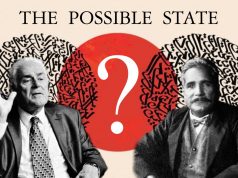“He, to whom the evil of his conduct is made alluring, so that he looks upon it as good” – the Quran (35:8)
The medieval Muslim intellectual Al-Ghazali cites this segment from the Quran while discussing the vice of pride, stating that this particular kind of pride is most difficult to cure. The person who deems his/her own view to be undoubtedly true could hardly be troubled to lend their ear to another’s view, or even if they do, they would be hard-pressed to abandon what they consider evidently to be absolute and saving truth.
Al Ghazali entertains the possibility that contrary to popular sentiment, absolute conviction may not always be virtuous. It may often be a veneer for an underlying insecurity and lack of intellectual confidence. Being absolutely certain of one’s opinion for reasons of personal sentiment and prejudice hardly befits a sound and sincere mind. Al Ghazali draws attention to the fact that practices of rationalizing and philosophizing may very well lose their way if overpowered by an untamed pride. And finally, the medieval scholar suggests some habits of mind as therapeutic advice to rid oneself of the disease of intellectual pride:
1. Begin with the presupposition that one’s own personal sentiment is often little more than an arbitrary preference or prejudice, which in itself is unworthy of any intellectual merit- let alone something to pride oneself over

2. One’s certainty or conviction may only be justified when it has been established not on an arbitrary intellectual inkling, but by systematic reasoning following the rules of logic or by the systematic study of scripture and its sciences.
The devil Mephistopheles in Goethe’s Faust also impresses the same point on a student who had come to him for academic advice:
“Make good use of your time! It hurries past,
But order and method make time last.
So, friend, take my advice to heart:
Hear lectures on Logic for a start.”
3. Like Mephistopheles, Al Ghazali insists that the attending of lectures, and systematic and disciplined study under scholars and specialists of various fields, is the surest way of proceeding in an orderly manner.
4. As for those who cannot meet the demands of academic integrity and rigor – which entails nothing less than an entire life in the ardent pursuit of knowledge – they must at least learn to do no harm: to not speak of what one cannot take the pains to know.
5. In matters pertaining to ethics, theology and philosophy, the non-academic only embarrass themselves by dabbling in these debates, and enthusiastically offering their own two pennies’ worth. For those who cannot lead their life in the devout pursuit of knowledge, it is best to know one’s limits and to defer to the academic authorities in various fields.
6. Those unprepared to take on the burden of knowledge, can do nothing more than content themselves with belief in another authority’s hearsay regarding any matter. Those who cannot hold intellectual burdens, must also forgo intellectual ambitions. By dabbling into advanced academics as an amateur, one only ends up doing more harm than good, to oneself and others.
7. Having recognized the limits of one’s academic reach, one must humbly confine oneself to one’s own field of experience or expertise, doing good in one’s own area, doing no harm by foolhardy forays into alien areas, and aiming to live a simple life of honesty and integrity.
Perhaps it is in this context, that one can better appreciate the pithy remark by the Prophet:
“He that is silent is saved.”
(Note from author: The above is based on a loose rendering of a section of Abu Hamid al Ghazali’s ‘Revivification of the Religious Sciences’).






